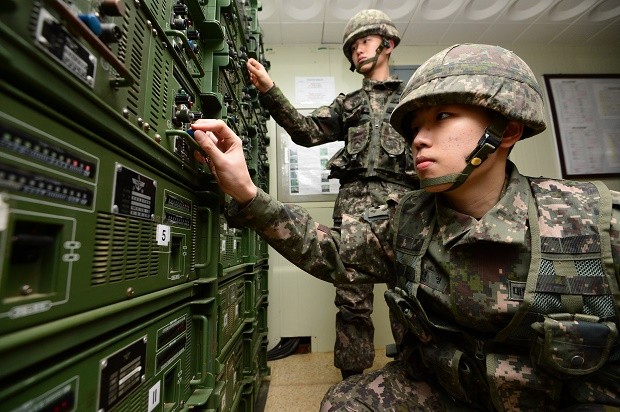North Korea warns of war over South’s propaganda broadcasts

South Korean army soldiers adjust equipment used for propaganda broadcasts near the border area between South Korea and North Korea in Yeoncheon, South Korea, Friday, Jan. 8, 2016. South Korea responded to North Korea’s nuclear test with broadcasts of anti-Pyongyang propaganda across the rival’s tense border Friday, believed to be the birthday of North Korean leader Kim Jong Un. AP
SEOUL, South Korea — North Korea warned of war as South Korea on Saturday continued blasting anti-Pyongyang propaganda across the rivals’ tense border in retaliation for the North’s purported fourth nuclear test.
North Korean propaganda is filled with warnings of war, but the country is also extremely sensitive to criticism of its authoritarian leadership, which Seoul resumed in its cross-border broadcasts on Friday for the first time in nearly five months. Pyongyang says the broadcasts are tantamount to an act of war. When South Korea briefly resumed propaganda broadcasts in August after an 11-year break, Seoul says the two Koreas exchanged artillery fire.
READ: South Korea to resume anti-North propaganda broadcasts
Speaking to a massive crowd at Pyongyang’s Kim Il Sung Square, a top ruling party official said the broadcasts, along with talks between Washington and Seoul on the possibility of deploying in the South advanced warplanes capable of delivering nuclear bombs, have pushed the Korean Peninsula “toward the brink of war.”
Pyongyang’s rivals are “jealous” of the North’s successful hydrogen bomb test, Workers’ Party Secretary Kim Ki Nam said in comments broadcast on state TV late Friday.
Article continues after this advertisementSouth Korea’s Yonhap news agency reported that frontline South Korean troops, near 11 sites where loudspeakers started blaring propaganda Friday, were on highest alert. Yonhap said Seoul had deployed missiles, artillery and other weapons systems near the border to swiftly deal with any possible North Korean provocation. South Korea’s Defense Ministry did not confirm the reports.
Article continues after this advertisementWhile the South’s broadcasts also include news and pop music, much of the programming challenges North Korea’s government more directly.
“We hope that our fellow Koreans in the North will be able to live in (a) society that doesn’t invade individual lives as soon as possible,” a female presenter said in parts of the broadcast that officials revealed to South Korean media. “Countries run by dictatorships even try to control human instincts.”
The broadcasts came as world powers sought to find other ways to punish the North for conducting what it said was its first hydrogen bomb test Wednesday.
US Secretary of State John Kerry urged China, the North’s only major ally and its biggest aid provider, to end “business as usual” with North Korea.
Diplomats at a UN Security Council emergency session pledged to swiftly pursue new sanctions. For current sanctions and any new penalties to work, better cooperation and stronger implementation from China is seen as key.
South Korean and US military leaders also have discussed the deployment of US “strategic assets,” Seoul’s Defense Ministry said. Officials refused to elaborate, but the assets likely are B-52 bombers, F-22 stealth fighters and nuclear-powered submarines.
READ: US, South Korea and Japan vow tough response to North Korea
After North Korea’s third nuclear test in 2013, the US took the unusual step of sending its most powerful warplanes — B-2 stealth bombers, F-22 stealth fighters and B-52 bombers — to drills with South Korea in a show of force. B-2 and B-52 bombers are capable of delivering nuclear weapons.
It may take weeks or longer to confirm or refute the North’s claim that it successfully tested a hydrogen bomb, which would mark a major and unanticipated advance for its still-limited nuclear arsenal. Outside experts are skeptical the blast was a hydrogen bomb, but even a test of an atomic bomb would push North Korea closer to building a nuclear warhead small enough to place on a long-range missile.
Late Friday, the Korea Institute of Nuclear Safety said a small amount of radioactive elements was found in air samples collected from the peninsula’s eastern seas after the blast but the measured amount was too small to determine whether the North had really detonated a nuclear device.
The institute said the level of xenon-133 isotopes found in the samples was similar to levels normally detected at its two radioactive gas detectors on the eastern and western coasts. KINS official Lee Ki-hyeong also noted that other types of xenon isotopes used to confirm nuclear explosions weren’t detected.
Lee said the institute will continue to collect and analyze more samples.
British Foreign Secretary Philip Hammond had asked South Korea to refrain from the propaganda broadcasts. But South Korea sees K-pop and propaganda as quick ways to show its displeasure — and a guaranteed irritant to the North’s sensitive and proud leadership.
The broadcasts include Korean pop songs, world news and weather forecasts as well as criticism of the North’s nuclear test, its troubled economy and dire human rights conditions, according to Seoul’s Defense Ministry.
READ: Seoul delivers barrage of K-pop across border to North Korea
Performers on Seoul’s propaganda playlist include a female K-pop band that rose to fame when its members fell multiple times on stage, a middle-aged singer who rose from obscurity last year with a song about living for 100 years and songs by a young female singer, IU, whose sweet, girlish voice might be aimed at North Korean soldiers deployed near the border.
North Koreans are prohibited from listening to K-pop, but defectors have said their countrymen enjoy music and other elements of South Korea popular culture that are smuggled into the country on USB sticks and DVDs.